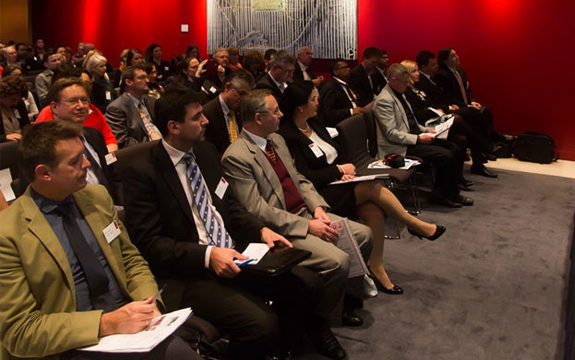Swinburne's Central European Business Forum: Building international business opportunities

In Summary
Small and medium sized businesses were recently given the opportunity to learn more about undertaking business with partners from Central Europe at Swinburne University of Technology’s Central European Business Forum.
Forming part of the 2015 Small Business Festival Victoria, the forum was organised and sponsored by Swinburne and the Consular Office of Hungary in Melbourne.
Over 100 attendees, 20 contributors and 10 representatives of sponsoring businesses spent an evening discussing the opportunities and experiences available between Australia and Central Europe.
Swinburne’s Dr Áron Perényi and Mr Peter Bakonyi, Head of Hungarian Consular Office, Melbourne agreed that the forum emphasised that Central European economies provide a substantial combined market potential, which is currently under-utilised by Australian firms.
“In order to exploit the potential for economic exchange between the two regions, governments can identify areas of shared interests and strategic objectives, which can be supported by appropriate policy arrangements. In particular, the need for removal of regulatory barriers has been suggested from both sides,” Dr Perényi said.
“The Central European Business Forum helped to make Central Europe visible to Australian businesses, and enable them to connect and engage with potential market opportunities for mutual benefit,” Mr Bakonyi said.
Opportunities highlighted during the forum included aviation and aerospace, resources, energy, tourism and hospitality, manufacturing, technology and research and development sectors.
Dr Perényi says the six key recommendations for Australian businesses that came from the Central European Business Forum are:
- Capitalise on the location advantages of Central European economies.
- Take advantage of unique resource advantages in respective countries, at the same time as recognising the shared characteristics of Central European markets which facilitate customer acquisition.
- Consider integration of value chains in order to satisfy customers in Australia and Central Europe.
- It is crucial to understand the structure of demand and purchase power (individual and institutional buyers).
- Explore building mutual brand recognition – and particularly country of origin branding for Australian and Central European products and services – as a key to accessing B2B and B2C markets.
- Australia and Central European businesses will benefit from continued sharing of information innovation, research and development capacities.
The forum included two panels:
Government:
- Mr Vojtech Helikar, Czech Trade, Sydney (Czech Republic)
- Ms Anna Petrasova, Embassy of the Slovak Republic, Canberra (Slovakia)
- Ms Rita Vago, Hungarian Consulate, Melbourne (Hungary)
- Mr Marek Kijewski, Embassy of Poland, Canberra (Poland)
- Mr Dan Barbulescu, Advisor to the Romanian Ambassador (Romania)
- Mr Stuart Rees, AusTrade (Australia)
Facilitator: Professor Bruce Wilson, director, EU Centre at RMIT
Keynote speech: Mr John Richardson, Director, Victoria State Office, Department of Foreign Affairs and Trade, Commonwealth of Australia
Business:
- Mr Mirek Zarnowski, Managing Director, NCIC Pty Ltd. and President, Polish Chamber of Commerce Australia Inc.
- Dr Ferenc Birlóni, CEO of Business Sprints and CTO of Zinemath Zrt
- Ms Tamara Bell, Director, National/International Programs, Aviation Aerospace and Board member, Australian Chamber of International Trade
- Mr Zsolt Zack Vigh, Owner, Korona Concierge
Facilitator: Mr Charles Kovess, Founder and Chief Speaker, Kovess International and President, Australian-Hungarian Chamber of Commerce and Industries
Sponsors of the event included Inglot Cosmetics, Korona Concierge, Mámor’s Chocolate Szalón, Northeastern University, Peak Equities, Qatar Airways, Slovak Embassy in Canberra and the State Government of Victoria.
Swinburne and the Consular Office of Hungary in Melbourne are working on the continuation of the Central European Business Forum event series.
For further information view the event summary or email Dr Aron Perényi.

